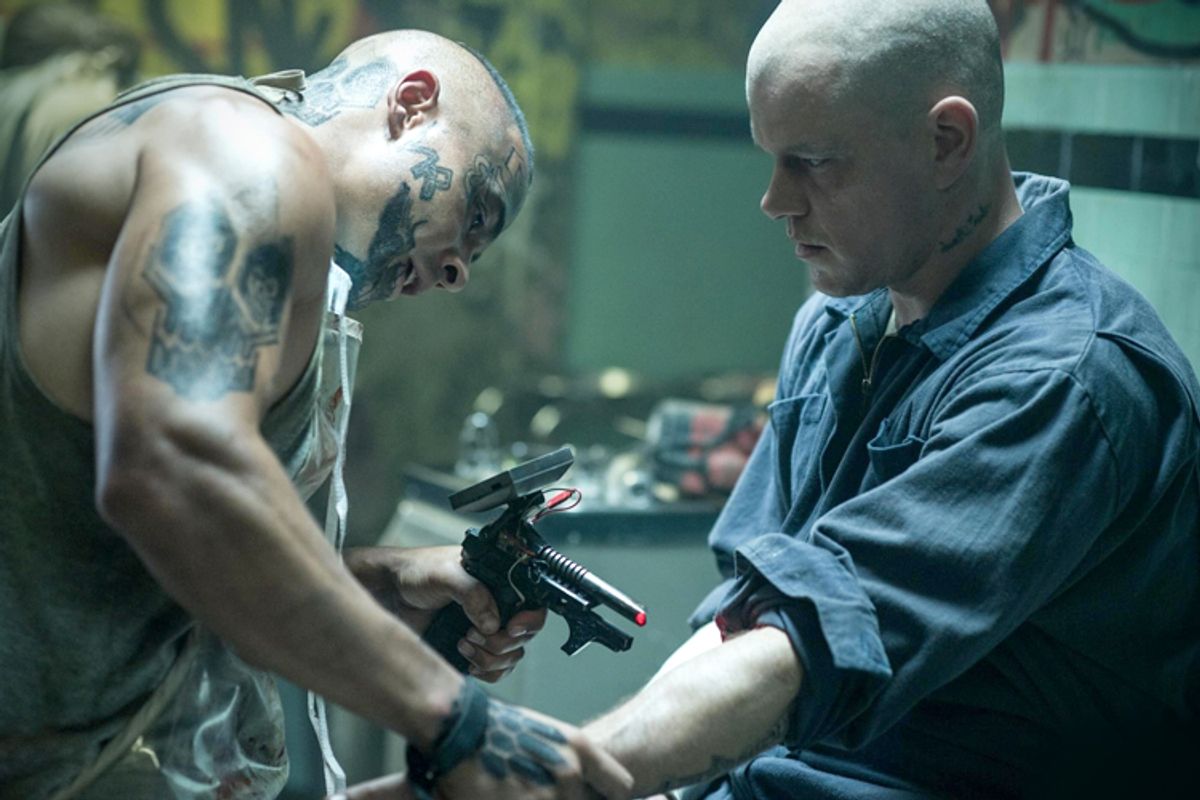The future of health care is "Elysium." In the dystopian film about a world split in two, Planet Earth has become one abject, dusty, polluted, crumbling, teeming conurbation. All the white people with money, plummy accents and clean clothes have fled to a gated community in space called Elysium, where the ordinary folk spend their days sipping champagne and lolling in palm canopied swimming pools, while the leaders spend theirs making sure no one from Earth gets in.
You wouldn’t be wrong if you thought the film were an Occupy parable about global inequality, but if you stopped there, you’d miss its brilliant analysis of the American health system.
On Elysium, we see where our quest for perfect diagnosis and treatment is heading. Every home has a Medi-Bed, a machine that looks a lot like an MRI, but it’s an MRI with a difference. Not only does it diagnose its fully clothed patient and create an electronic medical record in the form of a digital readout; it whirrs a bit longer and soon proclaims an instant cure with another digital readout.
Had your face blown off by a grenade? Zap! “Full facial reconstruction.” Got acute lymphoblastic leukemia? Zap! You’re “100 Percent Clean.”
It’s the ultimate in non-invasive diagnosis and treatment, and it all takes less than a minute. And hey, there’s no need for costly human labor—no doctors, nurses, aides, kitchen staff, janitors. No inefficient, time-wasting, face-to-face conversation. No superfluous compassionate looks, reassuring pats, warm smiles. And talk about perfect access —with a Medi-Bed in every home, there’s no worry about finding a provider who’ll accept you and your insurance (if you have any), not even any travel time to a competent clinic.
Nor is there any chance an Earthling might sneak into Elysium and get a cure. Before the Medi-Bed gets down to the business of perfect diagnosis and treatment, it acts as a perfect gatekeeper. It detects unauthorized medical tourism, and won’t operate for illegal immigrants. How? Easy. Passports are encoded in each person’s DNA and light up as a little orange rectangle that looks uncannily like a visa stamp.
On Earth, we see what’s left of medical care when technocratic perfection has been attained. They don’t have cures on Earth, all they’ve got is bandages and pills. But they do have care. Earth’s the only place in the film where taking care of the sick includes any human touching. People pick each other up and carry them to safety or a bed. While the hero vomits from radiation poisoning, his best friend strokes his back. A mother (in this case, the hero’s childhood best friend) can’t save her daughter from leukemia but she can love her and give her hope.
If the only care on Earth comes from ordinary people, what do Earth’s health care providers actually provide? We see some doctors passing through over-crowded hospital corridors, not doing anything to or with patients. We watch a doctor stand right beside the little girl with leukemia and tell her Mom that since there’s nothing the hospital can do for her, she’s discharged. Of course, if she gets sick again, bring her back, but right now she can’t take up a bed. What doctors do on Earth, it seems, is tinker ineffectually so long as they can do something for which they can charge, and shuttle patients in and out to maximize their billable time.
Oh, and not to forget drugs. To the hero who got radiation poisoning, the doctor gives a death sentence (five days) and a bottle of horse pills (three a day) to alleviate the pain while he dies at home or on the streets or wherever. It’s not the hospital’s worry what happens to patients after they’re discharged like so much human detritus.
On Earth, the pills that pass for treatment aren’t administered by professionals who know what they’re doing, but by sick people themselves and the people who love them. (If you have helped someone through chemo or a bone marrow transplant, you know what I’m talking about.) In the film, human caring has two meanings. By comparison with the quality of medical care on Elysium, it’s distinctly inferior. Yet, caring comes across as the thing that makes us human and life worth living. Caring for each other is still, and will always be, the salvation from misery.
But with the promise of a genuine cure, it’s no wonder sick Earthlings desperately try to crash their way into Elysium. And that’s the entire plot. Put that together with the two worlds of health care and you get the film’s political message: in a lot of ways, border control and restrictions on citizenship are about controlling access to good health.
Put the film’s two worlds of health care together, and you get a dead-on MRI of our health care system. Citizenship in the film is a metaphor for health insurance, and in real life as in the film, insurance thwarts equal access to medicine. Equal access to medical care means, or should mean, that each person gets the care he or she needs—a Medi-Bed. Medical treatment should not depend on what kind of insurance you have. But by replacing caregivers with machines, the champagne-sippers of the world insure that no human compassion can ever, ever override hard-nosed decisions about whom to treat -- the Medi-Beds automatically make sure no non-citizen ever gets treatment.
My dystopian fear about Obamacare is that the health exchanges will be even worse than the Medi-Bed border guards. That each state “exchange” will be an unruly assemblage of commercial, for-profit insurance plans, each with its own byzantine rules and benefits—not exactly a robot, but nearly as bad in its opaqueness and imperviousness to mere mortals. I wish, instead, that we had a universal insurance card, as most welfare states do—something like the little orange LED rectangle that lights up on the Medi-Bed, only it would light up for everybody.

Shares